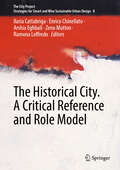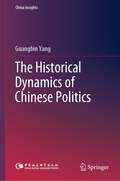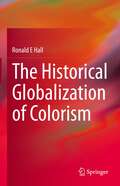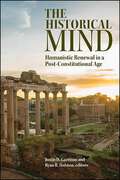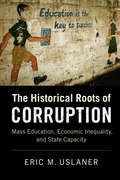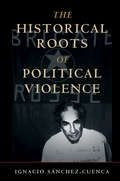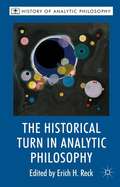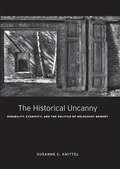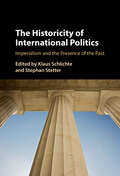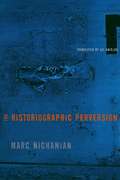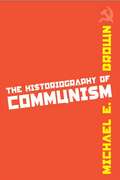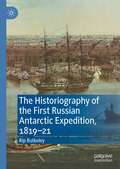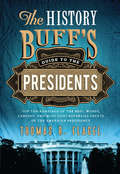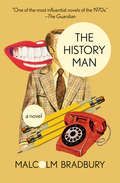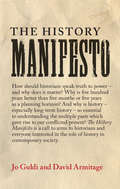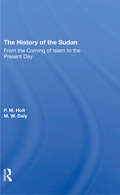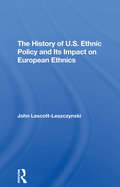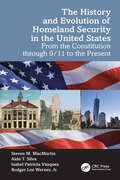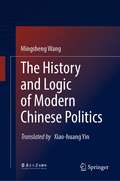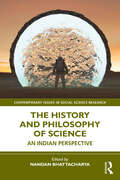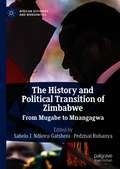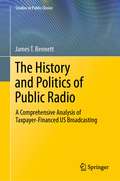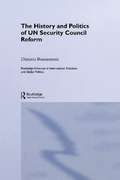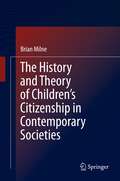- Table View
- List View
The Historical City. A Critical Reference and Role Model (The City Project #8)
by Ilaria Cattabriga Enrico Chinellato Arshia Eghbali Zeno Mutton Ramona LoffredoThis book offers a multivocal and interdisciplinary arena that brings together a wide range of thoughts and approaches addressing the intricacies of dealing with the historical city today. Spanning across a multitude of humanistic, sociological, and technological outlooks, it provides a multifaceted overview of current research on the city and its historicity. Based on revised and extended contributions presented at two international conferences, namely “The Historical City as a Critical Reference and Role Model for Innovative Urban and Metropolitan Development” (January 26-27, 2023) and “The Historical City as a Field for Critical Exercise. Criticism, Politics, Actors (April 17, 2023), both held at the University of Bologna, this book is an insightful and thought-provoking read for researchers in Architecture, History, Urban Studies, Social Sciences, and the Arts, as well as professionals and policy makers dealing with historical cities.
The Historical Dynamics of Chinese Politics (China Insights)
by Guangbin YangThis book puts forward a new perspective, the historical dynamics of Chinese politics, for better understanding China’s politics, which is from the vertical history of China and the dimension of horizontal world politics, combining the historical analysis of how Chinese politics has come along the way and the comparative analysis of China's governance achievements in world politics. Based on this premise, this book attempts to explain the democratic discourse of contemporary Chinese political logic. The historical dynamics of Chinese politics comes from long-term communication between the author and Western scholars, which may help the global audience to understand China’s politics from all angles.
The Historical Globalization of Colorism
by Ronald E HallThis topical book shows that racism by skin color is much more embedded and prevalent in the modern world than racism by race. In the aftermath of globalization, humanity has experienced unprecedented levels of interaction. This book presents evidence to show that in the 21st century which is dependent on ever-expanding communication technologies, and new forms of visual media actually exacerbate historical mores of colorism in the lives of humanity, i.e.: African, Asian, Latinx, Native and European descent. The book discusses the historical roots and current values of idealization of light skin, skin bleaching practices, stereotypes of skin color developed through migration and cultural assimilation, and health and educational consequences of colorism.
The Historical Mind: Humanistic Renewal in a Post-Constitutional Age
by Justin D. Garrison Ryan R. HolstonAmerica is increasingly defined not only by routine disregard for its fundamental laws, but also by the decadent character of its political leaders and citizens—widespread consumerism and self-indulgent behavior, cultural hedonism and anarchy, the coarsening of moral and political discourse, and a reckless interventionism in international relations. In The Historical Mind, various scholars argue that America's problems are rooted in its people's refusal to heed the lessons of historical experience and to adopt "constitutional" checks or self-imposed restraints on their cultural, moral, and political lives. Drawing inspiration from the humanism of Irving Babbitt and Claes G. Ryn, the contributors offer a timely and provocative assessment of the American present and contend that only a humanistic order guided by the wisdom of historical consciousness has genuine promise for facilitating fresh thinking about the renewal of American culture, morality, and politics.
The Historical Roots of Corruption: Mass Education, Economic Inequality, and State Capacity
by Eric M. UslanerWhy does corruption persist over long periods of time? Why is it so difficult to eliminate? Suggesting that corruption is deeply rooted in the underlying social and historical political structures of a country, Uslaner observes that there is a powerful statistical relationship between levels of mass education in 1870 and corruption levels in 2010 across 78 countries. He argues that an early introduction of universal education is shown to be linked to levels of economic equality and to efforts to increase state capacity. Societies with more equal education gave citizens more opportunities and power for opposing corruption, whilst the need for increased state capacity was a strong motivation for the introduction of universal education in many countries. Evidence for this argument is presented from statistical models, case studies from Northern and Southern Europe, Asia, Africa, Latin America, the United States, Canada, Australia, and New Zealand, as well as a discussions of how some countries escaped the 'trap' of corruption.
The Historical Roots of Political Violence: Revolutionary Terrorism in Affluent Countries (Cambridge Studies in Comparative Politics)
by Ignacio Sánchez-CuencaFollowing the protest movements and radicalism of the late sixties, many affluent countries experienced lethal revolutionary terrorism. Groups like the Red Brigades in Italy and the Red Army Faction in Germany provoked political crises in their countries. Other affluent countries, however, did not experience this same kind of violence. This book offers a historical-comparative explanation of this cross-national variation, focusing on the development paths followed by countries during the interwar period. The countries that followed a non-liberal path (marked by anarchist terrorism, democratic breakdowns, civil wars, land inequality, non-liberal capitalism, and late industrialization) suffered lethal left-wing terrorism decades later. Terrorism is thus explained as a feature of the political and economic system. Drawing on several fields, including comparative politics, political economy, international relations, and historical sociology, this book offers novel hypotheses about the determinants of violent conflict.
The Historical Turn in Analytic Philosophy
by Erich H. ReckDuring the last 25 years, a large number of publications on the history of analytic philosophy have appeared, significantly more than in the preceding period. As most of these works are by analytically trained authors, it is tempting to speak of a 'historical turn' in analytic philosophy. The present volume constitutes both a contribution to this body of work and a reflection on what is, or might be, achieved in it. The twelve new essays, by an international group of contributors, range from case studies on individual philosophers (Russell, Carnap, Quine, and Ryle) through discussions of broader themes in the history of analytic philosophy (in logic and philosophy of language, philosophy of mathematics, epistemology, philosophy of mind and psychology) to related methodological reflections (on the relationship between doing analytic philosophy and studying the history of philosophy, on various forms of philosophical history, and on their respective benefits).
The Historical Uncanny: Disability, Ethnicity, and the Politics of Holocaust Memory
by Susanne C. KnittelThe Historical Uncanny explores how certain memories become inscribed into the heritage of a country or region while others are suppressed or forgotten. In response to the erasure of historical memories that discomfit a public’s self-understanding, this book proposes the historical uncanny as that which resists reification precisely because it cannot be assimilated to dominant discourses of commemoration.Focusing on the problems of representation and reception, the book explores memorials for two marginalized aspects of Holocaust: the Nazi euthanasia program directed against the mentally ill and disabled and the Fascist persecution of Slovenes, Croats, and Jews in and around Trieste. Reading these memorials together with literary and artistic texts, Knittel redefines “sites of memory” as assemblages of cultural artifacts and discourses that accumulate over time; they emerge as a physical and a cultural space that is continually redefined, rewritten, and re-presented.In bringing perspectives from disability studies and postcolonialism to the question of memory, Knittel unsettles our understanding of the Holocaust and its place in the culture of contemporary Europe.
The Historicity of International Politics: Imperialism and the Presence of the Past
by Klaus Schlichte Stetter StephanThe Historiographic Perversion
by Marc Nichanian Gil AnidjarGenocide is a matter of law. It is also a matter of history. Engaging some of the most disturbing responses to the Armenian genocide, Marc Nichanian strikingly reveals the complex role played by law and history in making this and other genocides endure as contentious events. Nichanian's book argues that both law and history fail to contend with the very nature of events for which there is no archive (no documents, no witnesses). Both history and law fail to address the modern reality that events can be-and are now being-perpetrated that depend upon the destruction of the archive, turning monstrous deeds into nonevents. Genocide, this book makes us see, is in one sense the destruction of the archive. It relies on the historiographic perversion.
The Historiographic Perversion
by Marc NichanianGenocide is a matter of law. It is also a matter of history. Engaging some of the most disturbing responses to the Armenian genocide, Marc Nichanian strikingly reveals the complex role played by law and history in making this and other genocides endure as contentious events.Nichanian's book argues that both law and history fail to contend with the very nature of events for which there is no archive (no documents, no witnesses). Both history and law fail to address the modern reality that events can be-and are now being-perpetrated that depend upon the destruction of the archive, turning monstrous deeds into nonevents. Genocide, this book makes us see, is in one sense the destruction of the archive. It relies on the historiographic perversion.
The Historiography of Communism
by Michael E. BrownIn this fresh appraisal of communism and anti-communism, with an emphasis on the American case, respected scholar Michael E. Brown examines the methods, controversies and difficulties involved in writing the history of communism. Arguing that one important way of understanding communism--other than as a concrete political or ideological force--is as an expression of an essentially reflexive aspect of society that typically manifests itself in social movements. In this regard, Brown understands the history of communism as part of the history of society. Examining works by E. P. Thompson, Karl Marx, and Pierre Clastres, Brown develops the idea of history as an immanent feature of human activities. Taken together, the essays in this book--written over a period of 20 years-offer a distinctive approach to the connections between social theory, criticism, and historiography and to what is "social" about "social movements. "
The Historiography of the First Russian Antarctic Expedition, 1819–21
by Rip BulkeleyThis book looks at the different ways in which Russian historians and authors have thought about their country’s first Antarctic expedition (1819-21) over the past 200 years. It considers the effects their discussions have had on Russia’s Antarctic policy and may yet have on Antarctica itself. In particular, it examines the Soviet decision in 1949, in line with the cultural policies of late Stalinism, to revise the traditional view of the expedition in order to claim that it was Russian seamen that first sighted the Antarctic mainland in January 1820; this claim remains the official position in Russia today. The author illustrates, however, that the case for such a claim has never been established, and that attempts to make it damaged the work of successive Russian historians. Providing a timely assessment of Russian historiography of the Bellingshausen expedition and examining the connections between the priority claim and national policy goals, this book represents an important contribution to the history of the Antarctic.
The History Buff's Guide to the Presidents
by Thomas R. FlagelAmericans have named schools, counties, rivers, cities, and even their own children after U. S. presidents. Their work is in our laws, their words adorn our monuments, and their countenances appear in a trillion places (mostly on our currency). As we prepare to decide who will be the 44th president of the United States, can we truly say we understand the office and its phenomenal history? What do we really know about the men who helped transform a struggling republic into a superpower?Using detailed top-ten lists, historian Thomas R. Flagel offers a provocative new look at an astonishingly resilient institution. With diligent research, he explores the best, worst, largest, and most controversial facets of an office that some feared would become a monarchy, others hoped would represent all of the people, and John Adams wanted to call "High Highness, the President of the United States of America, and the Protector of their Liberties. "Chapters include: - Elections: the closest races, the most vicious campaigns, and the biggest landslidesPresidential Character: careers, hobbies, the most religious presidents, and the Machiavellians - The Domestic Sphere: the biggest deficit spenders, the most ambitious programs, vetoes, pardons, and the worst fights with the Superme Courts - Foreign Affairs: diplomats, doctrines, and ranking the commanders in chief - The Inner Circle: first ladies and vexing relatives, construction and destruction in the White House, scandals at the highest level, and the real West WingI - n Retrospect: the most underrated and overrated presidents, assassinations and attempted assassinations, and the greatest changes to the presidency itself
The History Man: A Novel (Picador Classic Ser. #55)
by Malcolm BradburyMalcolm Bradbury's classic skewering of 1970s academia, hailed by the New York Times as "an encyclopedia of radical chic as well as a genuinely comic novel" Among the painfully hip students and teachers at the liberal University of Watermouth, Howard Kirk appears to be the most stylish of them all. With his carefully manicured mustache and easygoing radicalism, Kirk prides himself on being among the most highly evolved teachers on his redbrick campus. But beneath Kirk's scholarly bohemianism and studied cool is a ruthless, self-serving Machiavellian streak. A sociology lecturer who outwardly espouses freethinking nonconformity, Kirk is himself vain and bigoted, dismissing female students and colleagues while releasing vitriol against those who contradict him, particularly his clever, wayward wife, Barbara, the long-suffering mother of his two children. A funny and incisive satire of academia and ideological hypocrisy, The History Man is one of Malcolm Bradbury's most acclaimed novels and remains just as sharp and witty today as when it was first published.
The History Manifesto
by David Armitage Jo GuldiHow should historians speak truth to power - and why does it matter? Why is five hundred years better than five months or five years as a planning horizon? And why is history - especially long-term history - so essential to understanding the multiple pasts which gave rise to our conflicted present? The History Manifesto is a call to arms to everyone interested in the role of history in contemporary society. Leading historians David Armitage and Jo Guldi identify a recent shift back to longer-term narratives, which they argue is vital for the future of historical scholarship and how it is communicated. This provocative and thoughtful book, published simultaneously in print and Open Access, makes an important intervention in the debate about the role of history and the humanities in a digital age. It will provoke discussion among policymakers, activists and entrepreneurs as well as ordinary listeners, viewers, readers, students and teachers.
The History Of The Sudan: From The Coming Of Islam To The Present Day
by P. M. Holt M. W. DalyThis volume provides an updated history of Sudan from the first contacts between the Muslim Arabs and the Christian Nubians to the invasion by the forces of Muhammad 'Ali Pasha. It includes information on the period before Turko-Egyptian invasion especially concerning the coming of Islam.
The History Of U.S. Ethnic Policy And Its Impact On European Ethnics
by John Lescott-LeszczynskiEthnic considerations have often played a part in the development of U.S. public policy, even for policies not directly targeting ethnic groups. This book surveys the impact of specific legislation on ethnics, particularly European ethnics, from a historical perspective. Its primary focus, however, is the contemporary body of legislation and regulation based on the 1964 Civil Rights Act, which laid the foundation for a conscious and comprehensive racial and ethnic policy intended to aid disadvantaged minorities. One of the major outcomes of the 1964 act was the implementation of affirmative action programs, mandated by the federal government for its own agencies, for federally funded institutions, and for private enterprise. Implementation depended on data collection based on federally developed racial and ethnic categories. Because European ethnics were not included as an identifiable category, many, discovered Dr. Lescott-Leszczynski, felt that preferential treatment for certain other ethnic groups operated to their disadvantage; ethnic tension inevitably resulted. Through a systematic review of laws, executive orders, federal agency directives, and related jurisprudence, Dr. Lescott-Leszczynski conveys the extent to which social change has been effected by ethnic policies and explores the ways in which ethnic policy develops, how it is expressed, how it is implemented, and how it is challenged.
The History and Evolution of Homeland Security in the United States: From the Constitution through 9/11 to the Present
by Steven M. MacMartin Aida T. Silva Isabel Patricia Vázquez Rodger Lee Werner, Jr.The History and Evolution of Homeland Security in the United States provides a comprehensive and insightful look into the evolution of US Homeland Security, from its early roots to the post-9/11 era. Drawing on their extensive experience as law enforcement professionals, the authors offer a unique perspective on the challenges and triumphs of this critical field. Students seeking degrees – with the goal of a career – in homeland security roles need a comprehensive and foundational understanding of the history of the Department of Homeland Security (DHS) and its predecessor agencies. This includes a detailed accounting of the elaboration of security policies and strategies as they developed in the United States, both before and after the formation of DHS, highlighting the challenges posed by both natural and human-caused threats. Beyond a historical retrospective, this book equips students with the critical thinking and analytical skills necessary to assess the effectiveness of past and present homeland security initiatives. By understanding the historical context, students can better navigate the complex issues surrounding privacy, border security, critical infrastructure protection, and more. As future professionals, students need that historical perspective in order to inform their understanding of current debates and controversies surrounding homeland security. The History and Evolution of Homeland Security in the United States provides a foundational understanding to foster critical thinking, analytical skills, and decision-making – helping the reader gain a historical perspective on the Department, its components, and policies to inform future thought leaders.
The History and Logic of Modern Chinese Politics
by Mingsheng WangThis book explores the history and development of modern Chinese politics. Written by Dr. Mingsheng Wang, a renowned Chinese political scientist, it presents a truly groundbreaking and thought-provoking study of the sociopolitical forces behind China’s gradual emergence as a new global power in the 20th century and its rapid rise as the world’s second-largest economy over the past 40 years. The author’s argument, illuminated by comparative theoretical analyses based on meticulously detailed empirical research, functions as a lens through which readers can better understand China’s remarkable accomplishments as well as consider broader issues that have perplexed many: Is there a China Path to sociopolitical progress? What is “socialism with Chinese characteristics”? Can China redefine its niche and maintain its growing momentum in an increasingly multilateral world? And finally, what lessons can we draw from China’s continuing progress in the post-COVID era?As the author argues eloquently and with persuasive evidence, China’s ongoing progress has followed neither the mode of Russian-style socialism nor that of Western prototypical capitalism. Rather, it represents a distinctively different model of progress and a continuous search for a viable alternative route to modernity that is permeated with Chinese realities. By identifying an alternative system described as the “China Path,” the author demonstrates convincingly that there exist ample options for different types of modernity and that economic growth means not only industrialization, but also the development of political democratization and the realization of the rule of law. In this sense, this book significantly enriches our understanding of modern China. The 33 carefully selected essays in the anthology provide a much-needed opportunity for scholars, policy makers and all interested readers to obtain an insider’s view of the history and prospect of China’s political development.
The History and Philosophy of Science: An Indian Perspective (Contemporary Issues in Social Science Research)
by Nandan BhattacharyaThis book provides an in-depth analysis of the history and evolution of the major disciplines of science, which include the basic sciences, bioscience, natural sciences and medical science, with special emphasis on the Indian perspective. While academic interest shown in the history and philosophy of science dates back to several centuries, serious scholarship on how the sciences and the society interact and influence each other can only be dated back to the twentieth century. This volume explores the ethical and moral issues related to social values, along with the controversies that arise in relation to the discourse of science from the philosophical perspectives. The book sheds light on themes that have proved to have a significant and overwhelming influence on present-day civilisation. It takes the reader through a journey, on how the sciences have developed and have been discussed, to explore key themes like the colonial influences on science; how key scientific ideas have developed from Aristotle to Newton; history of ancient Indian mathematics; agency, representation, deviance with regard to the human body in science; bioethics; mental health, psychology and the sciences; setting up of the first teaching departments for subjects such as medicine, ecology and physiology in India; recent research in chemical technology; and even the legacy of ancient Indian scientific discoveries. A part of the Contemporary Issues in Social Science Research series, this interdisciplinary work will be of immense interest to scholars and researchers of philosophy, modern history, sociology of medicine, physical sciences, bioscience, chemistry and medical sciences. It will be of interest to the general reader also.
The History and Political Transition of Zimbabwe: From Mugabe to Mnangagwa (African Histories and Modernities)
by Sabelo J. Ndlovu-Gatsheni Pedzisai RuhanyaThis book is the first to tackle the difficult and complex politics of transition in Zimbabwe, with deep historical analysis. Its focus is on a very problematic political culture that is proving very hard to transcend. At the center of this culture is an unstable but resilient ‘nationalist-military’ alliance crafted during the anti-colonial liberation struggle in the 1970s. Inevitably, violence, misogyny and masculinity are constitutive of the political culture. Economically speaking, the culture is that of a bureaucratic, parasitic, primitive accumulation and corruption, which include invasion and emptying of state coffers by a self-styled ‘Chimurenga aristocracy.’ However, this Chimurenga aristocracy is not cohesive, as the politics that led to Robert Mugabe’s ousting from power was preceded by dirty and protracted internal factionalism. At the center of the factional politics was the ‘first family’:Robert Mugabe and his wife, Grace Mugabe. This book offers a multidisciplinary examination of the complex contemporary politics in Zimbabwe, taking seriously such issues as gender, misogyny, militarism, violence, media, identity, modes of accumulation, the ethnicization of politics, attempts to open lines of credit and FDI, national healing, and the national question as key variables not only of a complete political culture but also of difficult transitional politics.
The History and Politics of Public Radio: A Comprehensive Analysis of Taxpayer-Financed US Broadcasting (Studies in Public Choice #41)
by James T. BennettThis book presents an absorbing study of how educational radio, which originated to broadcast weather forecasts to farmers, has become what the Pew Center calls the most trusted source of news for American liberals and a regular in the rogue's gallery of election-year conservative targets.The Nielsen Company reported in late 2019 that 272 million Americans listen to "traditional radio" each week, a number exceeding those who watch television, use a smartphone, or access the Internet. Yet almost from the start, radio has also been flayed as a noise box of inanity, a transmitter of low-brow entertainment, an instrument of cultural degradation promoting vapid popular music, and a medium whose ultimate purpose is to convince listeners to purchase the goods and services incessantly hawked by the advertisers who underwrite the programs and allegedly dictate content. At the same time, an alternative conception of radio existed as a vehicle for education and for cultural and intellectual (and even political) enlightenment. Most proponents of this perspective disdained advertising revenue and sought subsidies from foundations, wealthy patrons, or varying levels of government.The long, winding road of educational radio led eventually to the creation of National Public Radio (NPR), a fixture on the left of the dial that can be seen as either the consummation or corruption of the educational radio movement. Prized by many liberals, especially affluent whites, and disparaged by many conservatives, NPR has become a potent symbol of the political polarization and cultural chasm that now characterizes the American conversation.
The History and Politics of UN Security Council Reform (Routledge Advances in International Relations and Global Politics #Vol. 41)
by Dimitris BourantonisThis is a penetrating analysis of UN Security Council reform. It presents an overview of the current debates - emphasising the potential for, and modalities of, adjustment in the post-Cold War era - through a systematic investigation of the various reform proposals and the attitudes of member states. This is essential reading for all students and scholars of the United Nations and international relations.
The History and Theory of Children’s Citizenship in Contemporary Societies
by Brian MilneThis book examines the notion of children having full citizenship. It does so historically, through intellectual discourse, beliefs, and moral and ideological positions on children. It looks at the status and extent of knowledge of the position of children covering about 2500 years. The book takes European and other cultures, traditions and beliefs into consideration. It reflects on the topic from a variety of disciplines, including social sciences, theology and philosophy. The book places children's citizenship in the centre of children's rights discourse. Part of the work is a critical appraisal of 'children's participation' because it diverts attention away from children as members of society toward being a separable group. The book moves on from child participation using a children's rights based argument toward examination of the relationship of the child with the state, i.e. as potentially full member citizens.
